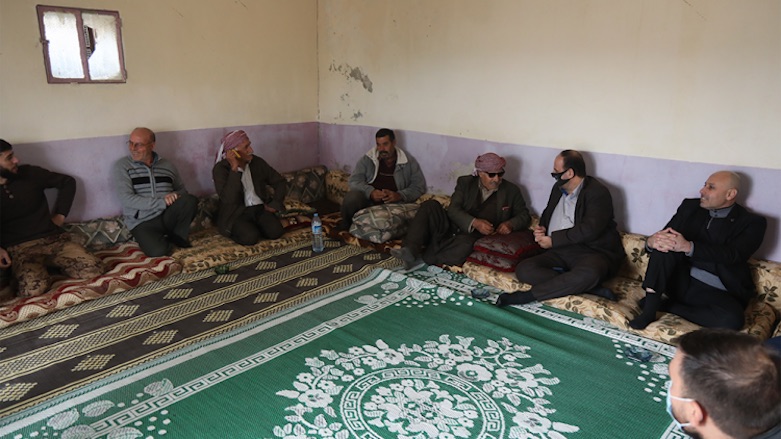Yezidis suspicious over Syrian opposition leader visit to town in Afrin

ERBIL (Kurdistan 24) – The President of the Syrian Opposition Coalition (SOC), Nasr al-Hariri, last week visited the predominantly Yezidi town of Basufan in Afrin in an attempt to improve the image of the Turkish-backed Syrian opposition following various human rights reports that documented abuses in areas Turkey occupied.
The SOC Media Department said in a statement on Nov. 5 that Hariri visited Basufan where he met local officials to “ascertain their well-being and living conditions.” The visit also included a trip to a Yezidi shrine, the statement said.
According to the Syrian opposition statement, “the townspeople said that they are freely practicing their faith and that their beliefs are fully respected.”
“They said that none of their homes and properties were seized by anyone as they demanded action against sporadic petty thefts,” it added.
The SOC also claimed that human rights violations are “referred to the competent committee and the judiciary,” noting that a number of Yezidi households have recently returned to the area.
In an interview with Kurdistan 24 on Oct. 23, Hariri said the Committee for the Protection of Property and Rights “is now working and submitting its reports,” adding that “their work is good, [but] it could be better.”
Read More: Arrests increase in Afrin, despite Syrian opposition promises to stop violations
The attempts by the Syrian opposition to improve its image comes after a damning report by the United Nations Commission of Inquiry on Syria in September that documented rape and human rights violations against civilians in areas Turkey occupied.
Among the various instances documented include cases of at least 30 women who were reportedly raped in February alone.
Pari Ibrahim, Founder and Executive Director of the Free Yezidi Foundation (FYF), told Kurdistan 24 that Hariri’s visit is “highly suspicious.”
“It appears to us that the Yezidi community in Afrin has been damaged by the events of recent years,” she said.
Experts have also expressed worries that there is a serious risk the group’s small community in Syria could go extinct as a result of years of victimization by the so-called Islamic State, the Syrian civil war, and ongoing Turkish threats.
Read More: Experts warn that Syria’s Yezidi minority is close to extinction
Thousands of residents from 20 Yezidi villages surrounding Afrin fled to camps in northern Aleppo after Turkey attacked the area in January 2018, with only a few returning.
Turkish-backed rebel groups took over the region with Turkish support on March 18, 2018, desecrating Yezidi shrines and other holy places.
In October 2019, the situation worsened when Turkey launched a fresh cross-border offensive, displacing hundreds of Yezidi families near Ras al-Ain (Serekaniye).
The United Nations Commission of Inquiry on Syria in a report published in September and March documented various rights abuses against Yezidis in Afrin, Tal Abyad, and Serekaniye.
The UN human rights body said in March that “civilians in and around Ras al-Ain and Tal Abyad reported numerous cases of looting and property appropriation by members of the Syrian National Army, primarily affecting Kurdish residents and, on occasions, Yezidi owners who had fled in October.”
“Schools and businesses, such as bakeries, were also looted or expropriated, along with land for making olive oil, agricultural tools, and vehicles,” the report added.
Editing by Karzan Sulaivany
